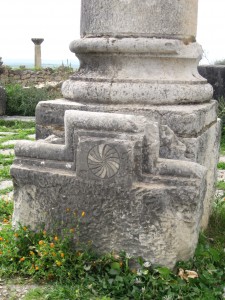The Roman city of Volubilis, in Morocco near Meknes between Rabat and Fez, blew me away. I’m something of a ruin junkie, so found it embarrassing that I’d never heard of the place. A UNESCO heritage site, Volubilis, devastated by an early 18th century earthquake, lies in a beautiful plain with gently rolling hills. A great deal of renovation has taken place; more is ongoing and a museum is being built. Currently there is no souvenir shop nor were there very many visitors in early April –great on both counts.
Our guide took us through the Appian Way, so clearly a Roman road with broad stones leading to the mothership, and pointed out a row of shops with signs delineating their use (bakery, wine-seller). There are several large houses with wonderful mosaics that made me wish for an effort to protect them; exposed to the elements as they are, further damage is inevitable.
There are several large houses with wonderful mosaics that made me wish for an effort to protect them; exposed to the elements as they are, further damage is inevitable.
Here, in a relatively small city on the outskirts of the Roman Empire, are all the Roman standards: a massive Arch of Caracalla, an aqueduct that provided water to buildings and flushed away sewage, several temples and a basilica.
Typical of Morocco, there were tensions about restorations made during the era of French colonization. Whatever you think of the Romans, they certainly knew how to design and build.
As bread and beer were features of Roman cuisine, this is recipe for one using the other, courtesy of a friend. No yeast, no rising, just mix and bake–it’s practical, like the Romans.
Faith’s Beer Bread
3 cups flour
Add 1 teaspoon of baking powder and ½ teaspoon salt for each cup of flour
¼ cup sugar
1 – 12 oz. can or bottle of beer (each brand of beer gives a slightly different flavor so you’re on your own here.)
Mix dry ingredients and add beer slowly trying to avoid foam if possible. Stir until well mixed and spoon into greased loaf pan. Bake 50-55 minutes @ 375 degrees until golden brown. Cool in pan for 5 minutes. Remove from pan and continue cooling on a rack. (Note: bread slices more easily if fully cooled.)
Skip the marathon, pass the butter.




Very interesting. Made me wish I had taken a differant route when I visited Morocco
all those many years ago. Bread sounds yummy too. Thanks Mari, you never
disappoint.
Love,
Elayne
Fascinating! Morocco is on my bucket list. It’s the source of some of the world’s most beautiful mineral specimens. French mineral collectors and dealers particularly have taken advantage of that. Also, Volubilis looks so very green and lush. Is it an oasis in the desert? Where did they get the water to fill their aqueduct? Is it artesian? And the name; is there a translation from the latin? The roots, volu- and -bilis, might suggest “swirling bile”. Perhaps that’s why it’s so green. 😉 LOL.
Last question … Have you tried any additives in the beer bread (like cheese, jalapeños, etc?)
An enjoyable column, Mari! Cheers and thank you!
Dana,
Sorry to take so long to respond but it involves going through (and trashing) a lot of comments. I read that the name may be a derivation of oleander oualilt, which grows in profusion on the banks of Wadi Khoumane that runs round part of the site. No idea if this is actually true, However, the Wadi (river) is there and must have served as the water source. As I recall, it’s not exactly an oasis as the land around isn’t desert but fairly green also because of the river. If you find a better derivation of the name, would love to know!
M
Love your travelogues – a vicarious pleasure for this arm-chair traveler.
Loved the recipe’s last line “Skip the marathon, pass the butter.”